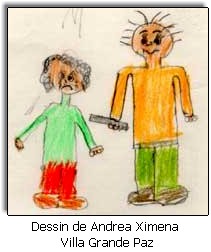"Pick out the toys that boys play with and those that girls play with; what are the rules of behaviour for each group? Then study the message being conveyed, the role girls and boys are destined to play in society and the value accorded to each group."

This is the introduction to a children's popular education workshop that was given in Guatemala. The workshop goes on, using the toys to illustrate traits considered as male (rational, objective, independent) that are valued by society, and those considered as female (emotional, subjective, dependent) that are not.
After analyzing men's and women's physical characteristics, the workshop leader concludes: "As women and men, we are more similar than different, but society has determined that our sexual differences justify actions and behaviour that favour one group over the other."
The manual produced by Guatemalan women focusses on discrimination in community life (rules governing inheritance) and the physical, psychological, and sexual violence suffered by women and girls (slaps, blows, cigarette burns, constant insults, manipulation, rejection, denial of affection, denial of access to material assets, forced sex).
Women who participated in the March in Nicaragua also organized workshops for children that allowed them to express through drawings the abuse they had suffered. In Portugal, women held an action aimed at schools that proposed a non-sexist curriculum and the elimination of violence.





